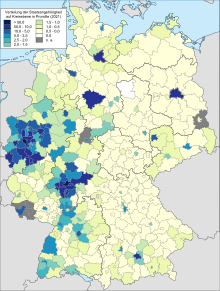 Distribution of Moroccan citizens in Germany (2021) | |
| Total population | |
|---|---|
| 300,000[1] | |
| Regions with significant populations | |
| Rhine-Main Metropolitan Region (especially Düsseldorf Frankfurt & Offenbach, Wiesbaden, Mainz, etc.), Düsseldorf surrounding areas, Dortmund, Cologne, Bonn, Essen, Nürnberg, Bielefeld, Berlin, Duisburg, Hamburg, Stuttgart, Wuppertal, | |
| Languages | |
| German and Moroccan Arabic / (mostly) Berber languages | |
| Religion | |
| Predominantly Islam | |
| Related ethnic groups | |
| Berbers, Algerians, Tunisians |
Moroccans in Germany (Arabic: المغاربة في ألمانيا) are residents of Germany who are of Moroccan descent. According to the Federal Statistical Office of Germany, as of 2018, there are total 76,200 Moroccan citizens living in Germany without German citizenship. Of those, 505 individuals were granted asylum status.[2]
Nowadays, most Moroccan-Germans have German and Moroccan citizenship.[3][4]
In Germany, especially in the Rhine-Main area, many persons of Moroccan descent have roots in the province Nador.[5][6][7]
Among the Moroccan community in Germany, there is also a small, significant minority of people of Spanish-Moroccan origin.[8]
According to a BKA report on statistics from 2017, immigrants from Morocco constituted 1.0% of all asylum seekers between 2015-2017 and those group represent 3.9% of all migrant crime suspects.[9]
- ^ "L'Allemagne veut attirer 40.000 Marocains par an". Retrieved 1 December 2017.
- ^ "Ausländische Bevölkerung und Schutzsuchende nach Regionen und Herkunftsländern". Statistics Germany. Retrieved 15 November 2017.
- ^ "Migranten und Migrantinnen - Demografiebericht 2010 Düsseldorf" (PDF). düsseldorf.de. Retrieved 15 May 2019.
- ^ "Einbürgerung doppelte Staatsbürgerschaft (Hessen, 2000)". bagiv.de. Retrieved 15 May 2019.
- ^ Berriane, Mohamed (2014). "Die marokkanische Migration nach Deutschland aus der Sicht Marokkos". Jenseits von Rif und Ruhr (in German). pp. 269–298. doi:10.1007/978-3-658-00899-4_15. ISBN 978-3-658-00898-7.
- ^ "Marokkanische Frankfurter oder Frankfurter in Marokko". journal-ethnologie.de (in German). Retrieved 2019-06-07.
- ^ ""Ich roll mit meinem Abi im schwarzen Maserati": Aufwachsen in Offenbach". vice.com. Retrieved 2019-06-07.
- ^ "Farid startete Karriere in Oberbilk". nrz.de. 9 May 2016. Retrieved 2019-06-07.
- ^ "Kriminalität im Kontext von Zuwanderung - Bundeslagebild 2017". BKA. 2018. p. 13. Archived from the original on 2018-08-02. Retrieved 2018-12-26.